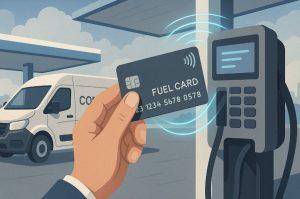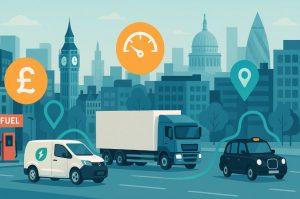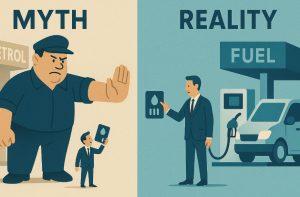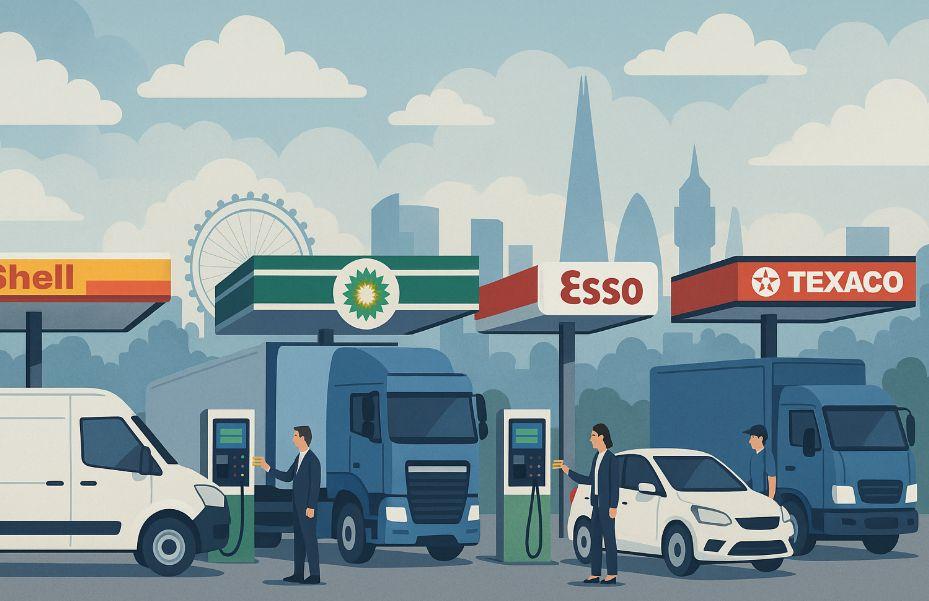In the competitive world of business logistics, fuel management plays a pivotal role in keeping operations lean and efficient. For companies operating in major economic zones like London, managing vehicle-related expenses is a daily necessity. As we move into 2025, the demand for streamlined, cost-effective solutions has made fuel cards a go-to resource for fleet and financial managers alike.
This comprehensive guide explores the best fuel card companies in the UK, how these systems work, what features to prioritise, and the top providers available for British businesses this year.
What Are Fuel Cards?

Fuel cards are specialised payment tools that allow businesses to control and monitor fuel spending across their fleet. Rather than reimbursing employees or relying on credit cards, companies issue fuel cards which are used exclusively for fuel and related vehicle expenses.
How Are Fuel Cards Different from Standard Payment Cards?
Unlike debit or credit cards, fuel cards come with built-in control mechanisms, such as transaction limits, approved station networks, and data tracking. They’re tailored to streamline business fuel expenditure with real-time monitoring and consolidated invoicing.
How Do They Work for UK Businesses?
Fuel cards operate on a secure platform managed by a fuel provider or third-party network. Each transaction is recorded digitally, with data synced to a company account, making it easier to manage fuel usage, reconcile invoices, and track vehicle mileage.
Step-by-Step Fuel Card Process
- Driver fills up at an authorised petrol station
- Fuel card is presented at the till or inserted at the pump
- Optional mileage input may be required
- Transaction is logged and added to the business’s online account
- The company receives a unified invoice weekly or monthly
Why Should Businesses in London Consider Using Fuel Cards in 2025?

Running a business in London comes with logistical complexities, from congestion charges to regional fuel price fluctuations. Fuel cards offer tangible solutions to these local challenges.
Local Coverage and Station Access
Major fuel card providers have extensive coverage within the M25 corridor, with many accepted at stations within London boroughs, business parks, and transport hubs.
Support for Delivery and Logistics Businesses
From same-day couriers to construction firms, London-based companies benefit from consistent fuel pricing and centralised fleet data key in a city where time and cost savings are crucial.
Which Are the Top Fuel Card Companies in the UK Right Now?
Let’s look at a comparison of top-performing fuel card providers serving UK businesses in 2025:
| Provider | Network Access | Ideal Business Size | Pricing Format | Key Benefits |
| Allstar | 7,700+ stations (multi-brand) | SMEs to Large Enterprises | Fixed or Pump Price | Carbon offset options, expense control |
| Shell | Shell + selected partners | Logistics, HGVs | Fixed + Discounts | CO₂ reporting, loyalty programme |
| BP | BP + partner stations | Mid to Large Fleets | Weekly Fixed Price | Extensive network, real-time data |
| Esso Card | Esso, Shell, BP | Local & Regional Fleets | Pump Price | Mixed network, diesel card availability |
| UK Fuels | 3,000+ UK stations | Small Businesses | Competitive Fixed | Simple dashboard, flexible billing |
| Texaco | Texaco + UK Fuels Network | Sole Traders & SMEs | Fixed or Pump | No transaction fees, online control panel |
How Can You Choose the Best Fuel Card for Your Business Needs?
The “best” fuel card is not universal it depends on your company’s size, coverage requirements, fuel usage, and operational goals.
Fleet Size and Frequency of Use
- Small fleets (1–5 vehicles): Benefit from prepaid or low-fee cards with digital controls
- Medium to large fleets: Need advanced analytics, fraud detection, and widespread acceptance
Urban vs. Regional Operations
Companies operating exclusively in London may prefer branded cards with better urban station density, while regional businesses require cards with national coverage.
Fuel Type and Vehicle Compatibility
Some cards focus on diesel networks for HGVs, while others support unleaded or electric charging a growing need in London’s Ultra Low Emission Zone (ULEZ).
What Are the Key Features to Look for in a Fuel Card Provider?

Not all fuel cards are created equal. Here’s what businesses should consider before signing a contract.
Network Reach and Compatibility
Multi-network cards offer flexibility across fuel brands and are ideal for fleets that travel extensively. Always check if the card is accepted at local filling stations.
Real-Time Monitoring Tools
Providers now offer apps and dashboards that track fuel spend per driver, vehicle mileage, and fuel economy trends vital for keeping costs down.
Cost and Transparency
Look for cards with no hidden fees, low surcharges, and transparent pricing structures. Many providers now share real-time pricing updates to enhance clarity.
Are Fuel Cards Cost-Effective Compared to Traditional Payment Methods?
Fuel cards offer more than fuel savings they drive efficiency in admin, compliance, and planning.
Detailed Cost Analysis
| Payment Type | Fuel Discounts | VAT Reclaim | Admin Efficiency | Overall Benefit |
| Fuel Cards | High | Easy | High | Excellent |
| Credit Cards | Low | Complex | Medium | Fair |
| Cash Reimbursements | None | Difficult | Low | Poor |
Case Example
A London-based courier company saved over £5,000 annually by switching from manual reimbursements to a fuel card system, thanks to better fuel rates and reduced processing time.
How Do Fuel Card Providers in the UK Handle Data & Reporting?
With digital transformation leading the way, fuel card systems have become increasingly data-driven.
Usage Analytics
Get access to driver-specific and vehicle-level data, identifying inefficient routes or vehicles with high fuel consumption.
Automated VAT Invoicing
All HMRC-compliant invoices are delivered directly to the company account, making tax claims quick and audit-proof.
Spending Controls
Set spend limits, block weekend use, and track anomalies vital for businesses concerned about internal misuse or fuel theft.
What Are the Common Myths About Business Fuel Cards?

Despite their popularity, several myths prevent businesses from adopting fuel cards. Let’s dispel some of them.
“They’re Only for Big Companies”
Many providers now offer packages for startups, sole traders, and freelancers with no minimum vehicle requirement.
“Fuel Cards Restrict Fuel Station Choice”
Multi-network cards are accepted at thousands of stations, including supermarket forecourts and major fuel brands.
“They Have Hidden Costs”
Transparent providers offer clear breakdowns of fees. The key is to read contracts carefully and ask questions before signing.
How Is the Fuel Card Industry Evolving in 2025 and Beyond?
With environmental regulation tightening and fuel prices remaining unpredictable, fuel cards are evolving to meet new demands.
Green Fuel Card Options
Providers now include electric vehicle (EV) charging support and carbon tracking tools to help meet ESG goals.
AI and Predictive Analytics
Machine learning tools are helping companies forecast fuel needs, optimise routes, and identify fraud patterns before they cause damage.
Enhanced Mobile Integration
Mobile-first card management is the norm in 2025, with instant card locks, location-based station finders, and mileage tracking apps.
What Questions Should You Ask Before Signing Up With a Fuel Card Company?
To avoid costly mistakes, businesses should be prepared to probe providers with detailed questions.
- Is there a monthly or annual fee?
- What’s the average fuel savings per litre?
- Are there limits or blackouts on station use?
- How long is the contract term?
- Is there a cancellation charge?
How Can Businesses Avoid Hidden Fees When Using Fuel Cards?
One of the most common pain points reported by fuel card users is unexpected charges. Here’s how to avoid them.
Read the Fine Print
Always ask for a copy of the full terms and conditions and pay special attention to the fee structure.
Avoid Overuse of Out-of-Network Stations
Some cards apply surcharges when used outside approved networks. Use the provider’s app to plan routes accordingly.
Confirm Admin Fees
Many companies charge fees for invoice delivery, paper statements, or replacement cards. These can add up quickly if unmanaged.
What Are the Alternatives to Fuel Cards for Managing Fuel Expenses?

Fuel cards aren’t the only solution for managing fleet fuel expenses but they are often the most efficient.
Business Credit Cards
While convenient, they lack fuel-specific reporting and control features. VAT claims also become more complex.
Expense Reimbursement
Employees pay for fuel and submit receipts. This is admin-heavy and prone to error or fraud.
Fuel Apps with Cashback
New digital apps offer discounts and cashback at specific stations, but lack the integration and reporting features of traditional fuel cards.
Conclusion
Fuel cards have become indispensable tools for UK businesses seeking control, transparency, and efficiency in fuel spending. Whether you’re running a small courier fleet in London or a national logistics company, there’s a fuel card solution tailored to your needs in 2025.
With innovations in digital reporting, green fuel support, and flexible pricing models, providers like Allstar, Shell, and UK Fuels are leading the way. By understanding your unique operational needs and comparing the market carefully, your business can fuel up smarter and grow faster.
FAQs About Fuel Card Companies UK
What is the difference between fuel cards and company credit cards?
Fuel cards are designed specifically for vehicle-related purchases, with detailed reporting and better VAT reclaim options.
Can fuel cards be used at supermarket fuel stations?
Yes, multi-network cards often work at Tesco, Sainsbury’s, and Morrisons fuel stations.
Are fuel cards suitable for sole traders in the UK?
Yes, several providers offer no-minimum plans for freelancers and one-person businesses.
How do I apply for a fuel card in the UK?
Online applications are quick, requiring business registration and vehicle details.
What happens if a fuel card is lost or stolen?
Most providers offer 24/7 card cancellation and fraud protection services.
Should I choose a branded or multi-network fuel card?
Branded cards may offer better loyalty benefits; multi-network cards provide more flexibility.
How secure are UK business fuel card systems in 2025?
Advanced technologies like PIN security, transaction limits, and geofencing offer strong protection.









Leave feedback about this